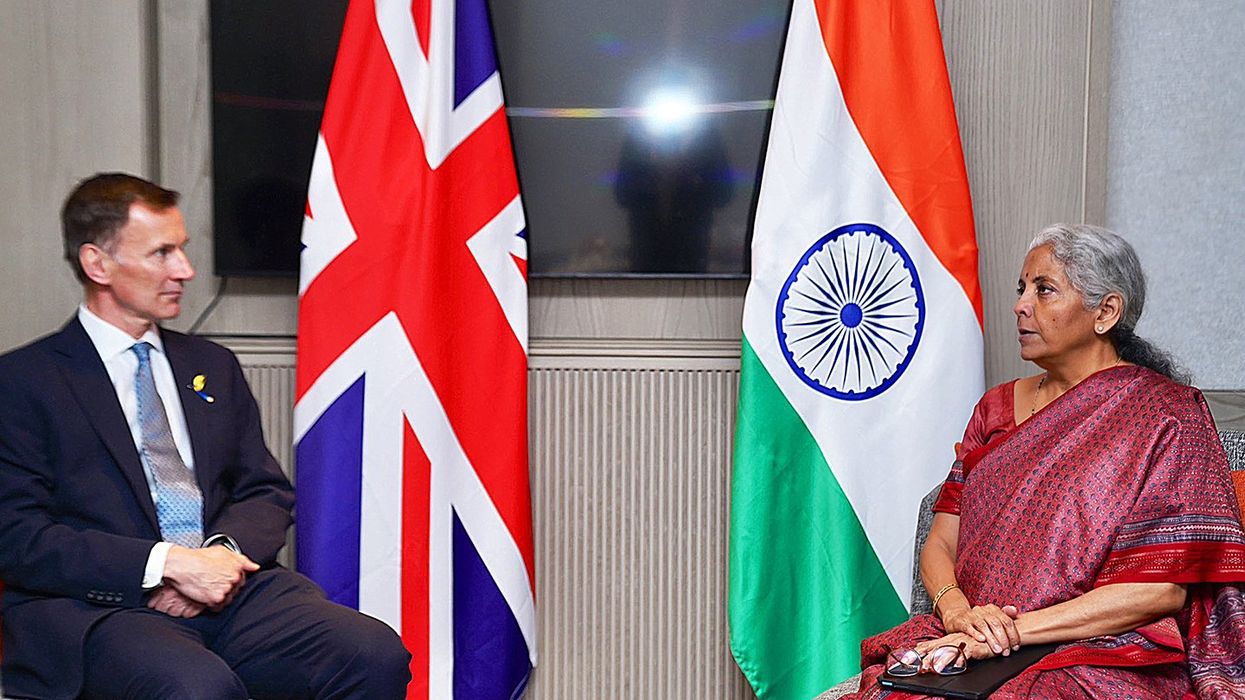INDIA and the UK have agreed to make further progress on the ongoing negotiations for a free trade agreement (FTA) and also to swiftly organise the next bilateral Economic and Financial Dialogue soon, the British government has said.
At the conclusion of UK chancellor Jeremy Hunt's India visit last week, the UK's treasury department said the finance minister held talks with Indian counterpart Nirmala Sitharaman with a focus on deepening bilateral economic and financial ties.
“At a meeting with Indian finance minister Sitharaman, both sides agreed to make further progress on the UK-India free trade agreement and deepen bilateral economic and financial ties,” the treasury department said in a statement on Saturday (25).
“They agreed to make swift progress on setting up the next UK-India economic and financial dialogue,” it said.
Hunt, on his first international visit as UK chancellor, also met with business leaders in Bengaluru and visited the offices of tech multinational Wipro which employs over 4,000 people in the UK.
“Meeting fellow finance ministers face to face is an excellent opportunity to make real progress on the key global economic issues of our time,” said Hunt.
“I first visited India 38 years ago, and it's been fascinating to see how much the country has changed in this time – there are positive lessons to be learnt from their successful rapid development.
“It's been great to hear from Indian technology business leaders here in Bengaluru how they are pushing the country's economy forward, and I look forward to further collaboration between India and the UK as we continue to trade and create jobs – delivering on the government's plan to grow the economy,” he said.
Officials from India and the UK began the seventh round of FTA talks earlier this month, picking up from the sixth round of negotiations conducted in New Delhi in December 2022 with the visit of UK trade secretary Kemi Badenoch.
The bilateral trade between the two countries increased to $17.5 billion (£14.7bn) in 2021-22 compared to $13.2bn (£11bn) in 2020-21. India's exports stood at $10.5bn (£8.8bn) in 2021-22, while imports were $7bn (£5.9bn).
The chancellor, alongside Bank of England governor Andrew Bailey, attended a meeting of G7 finance ministers and central bank governors on Thursday (23). They were joined virtually by Ukrainian finance minister Serhiy Marchenko.
"Their statement sent a strong message of condemnation for Russia's war of aggression against Ukraine, announced an increase of financial support for the Ukrainian government to a total of $39bn (£32.7bn) in 2023 and committed to continue supporting vulnerable countries hardest hit by the economic impact of the war," the treasury said.
The UK announced a fresh wave of internationally coordinated sanctions and trade measures, to "further restrict Russia's capability to wage war in Ukraine both now and in the future".
At the first G20 finance ministers and central bank governors meeting under the Indian presidency, Hunt condemned "Russia's brutal acts" in the strongest terms, emphasising that securing peace was the most important action for global growth.
While speaking at the meetings, the chancellor is said to have set out the UK government's intention to protect the most vulnerable from cost-of-living pressures, whilst maintaining fiscal sustainability with debt falling and not adding to inflationary pressure.
He added that the upcoming spring budget of the Rishi Sunak-led government on March 15 will "drive economic growth, focusing on skills, business and infrastructure investment and research and innovation, as well as reviewing regulations of the UK's key growth industries".
(PTI)





